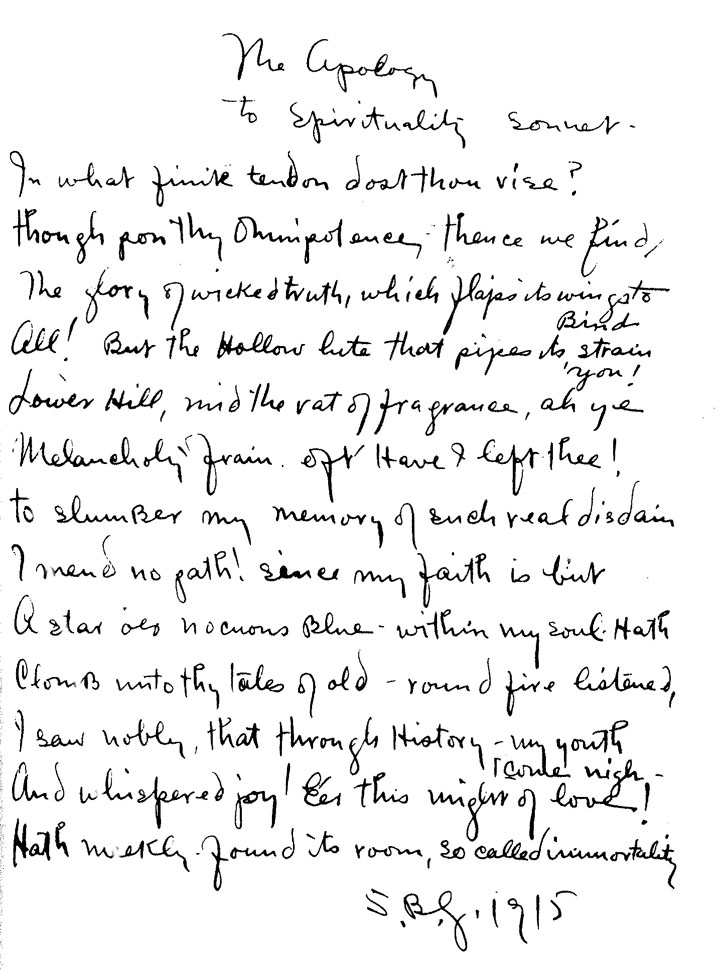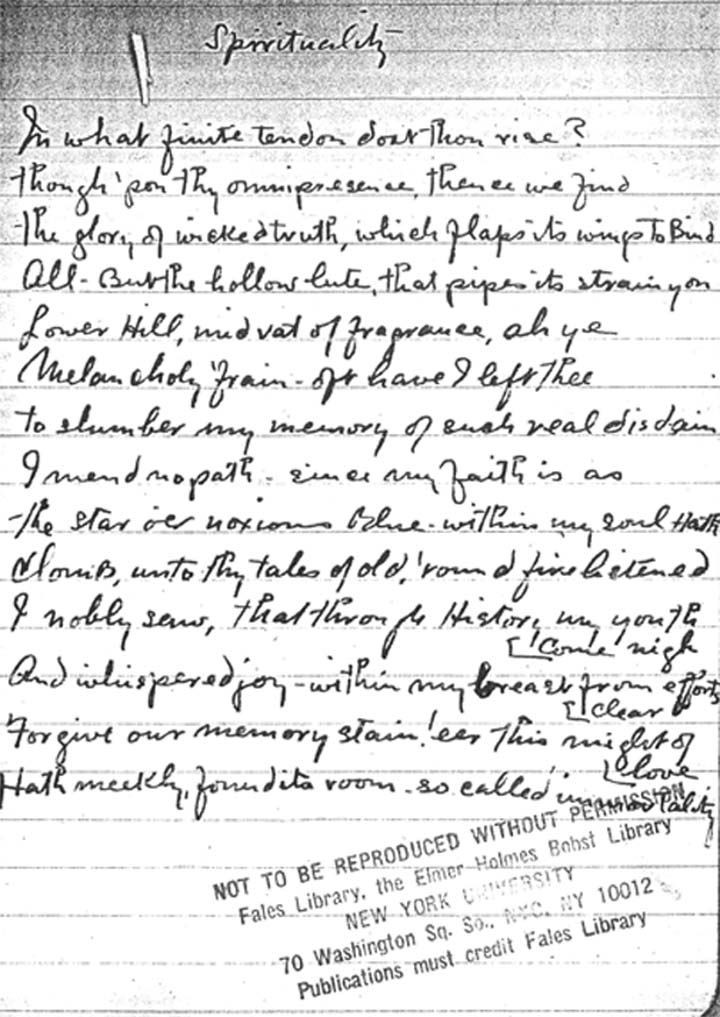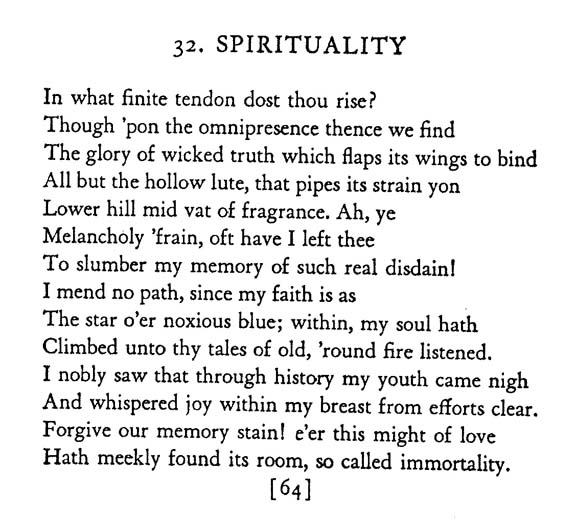Samuel Greenberg
“Strangeness was becoming an awe of interest”
— “Between Historical Life” (p. 110, 1947 edn.)
“O what I would give for the knowledge of grammatic truth”
—“Between Historical Life” (p. 116, 1947 edn.)
Samuel Greenberg – a second-wave moderist poet – was born in Vienna in 1893 and died of tuberculosis in New York in 1917, a the age of 23. An immigrant, he came to New York’s Lower East Side when he was seven and went to school only until the seventh grade. Unpublished in his own lifetime, Greenberg is primarily known as an important source for Hart Crane, whose “Emblems of Conduct” is a pastiche of Greenberg’s work. Similar in sprit to somewhat later second-wave “ideoloectial” modernists (such as Crane), Greenberg practiced a radical form of sprung lyric — a wild, sound-wracked, syntactic syncretism that verges on the abstract and the rhapsodic, which I associate with Crane and Hopkins (and which also brings Blake to mind), but might also be described as a cross between Leo Gorcey reciting Shakespeare and the poetical works of Elsa von Freytag-Loringhoven. In the postwar period, I’d point to Joseph Ceravolo’s Fits of Dawn, many of the works of Clark Coolidge and J. H. Prynne, Kenneth Koch’s When the Sun Tries to Go On, the early poems of David Marriott, though none of these poets have quite the ecstatic grammatic extavagance of Greenberg (I certainly I feel an affinity with Greenberg in my own farflung sprung lyrics).
Greenberg’s work was first collected as Poems from the Greenberg Manuscripts, edited by James Laughlin (New York: New Directions in 1939); followed by the Henry Holt edition in 1947, Poems: A Selection from the Manuscripts, edited with an introduction by Harold Holden and Jack McManis, with a preface by Allen Tate. Tate described Greenberg’s work as “turgid and bathetic” — but then bathos is part of what makes these poems so appealing (and bathos is a central rhetorical choice of thes poems). Depite the great efforts the editors made to preserve and publish Greenberg’s work, their edition makes a number of unwarranted changes to the manuscript, especially with punctuation and capitalization, cleaning the poems up but in the process erasing some of the charming quirkiness and also some key semantic dynamics.
In “Young Poets Dead, ” a generous response to Greenberg published in The Sewanee Review, (Vol. 55, No. 3; July-September, 1947), John Berryman writes that Crane and Greenberg share “reliance on inspiration and ejaculation” (p. 505). “There is some power of phrasing, but not much of composition. Greenberg had with rare exceptions so little control over syntax … ” (p. 506). I think this is what I like as much as anything else in these work, what gives them their most radically modernist dimension. His swerve from syntax as a principal of clausal subordination and hierarchy opens up the field of serial apostrophe that pushes to liberate itself from the confines of “literary” diction.
In 2005, Michael Carr and Michael Smith edited a small edition of Greenberg called Self Charm: Selected Sonnets & Other Poems, ed. (Cambridge: Katalanché Press, 2005). The editors have carefully noted the erratic spelling and punctuation of Greenberg’s poems, for example, restoring the hanging comma in the last line of “Enigmas”: “Mine eye lids shut, I fell into unfelt realms,”. Greenberg, whose holograph manuscripts are at the Fales collection at New York University, has been fortunate in finding these remarkable editors. In addition, Michael Smith has , a stunningly good web site for Greenberg: http://logopoeia.com/greenberg/. See for example Smith’s website version of the “Spirituality” [below] , which corrects erroris in the 1947 published version; note, though, that Smith’s web version does not use his own late, presumably more accurate, version of “Enigmas.” The web edition is going in the right direction, but it’s not there yet.
I particularly recommend these poems from the web edtion:
“Enigmas”
“Secrecy”
“Immortality”
“Memory”
“The Philosophique Apology”
Two crucial poems
“To Dear Daniel”
“God”
are not on the site, so I have included below (based, unfortunately, on the 1947 edition).
See a subsequent article on Greenberg (12/16/11) at https://jacket2.org/commentary/pale-impromuptu-samuel-greenberg-poems
There is a loud noise of Death
Where I lay;
There is a loud noise of life
Far away.
From low and weary stride
Have I flown;
From low and weary pride
I have grown.
What does it matter now
To you or me?
What does it matter now
To whom it be?
Again the stain has come
To me;
Again the stain has come
For thee.
I followed and breathed in silence.
What if its task is beheld?
My feeding thee has lent all
Which broke the current thread breeze
That kept the sprout of pregnant seas
Of weathered promising call.
The filing shades he only changes,
Tells the logos, its unearned dew
Not to feed, as if from cages,
His cloak that perfumes fragrant hew;
What of all the bulging mountains,
Sordid earth and rotting clays?
If then sense is suction fountains,
That same thought is but its ways.
Apology to Sprituality: A Case Study
The 1947 Holt edition reproduce a draft of the “Spirituality” sonnet, but not the final holograph copy text that the editors used for their edition:
 Here is my transcription of the draft:
Here is my transcription of the draft:
The Apology
to Spirituality Sonnet.
In what finite tendon dost thou rise?
though pon thy omnipotence, thence we find,
The glory of wicked truth, which flaps its wings to Bind
All! But the Hollow lute, that pipes its strain ’yon!
Lower Hill, mid vat of fragrance, ah ye
Melancholy ’frain. oft have I left thee!
to slumBer my memory of such real disdain
I mend no path! since my faith is but
A star oer noxious Blue – within my soul Hath
ClomB, unto thy tales of old – round fire listened,
I saw nobly, that through History – my youth come nigh –
And whispered joy! E’er this might of love!
Hath meekly found its room, so called immortality
Now, here is the holograph ms of the final version, which the Holt editor’s used as their copy text. The holograph is used with permssion of the Fales Library at New York University; my thanks to Fales for letting me present it here:
The most striking change from the draft is in the second line, “though pon thy Ominpotence” is now “Though ‘pon the omnipresence”. Also Greenberg added an enire phrase to the final lines, to bring the poem from 13 to 14 lines.
This is what the Holt edtiors printed (changing to make consistent a number of erratic elements in Greenberg final holgraph – that is, “correcting” punctuation, capitalization, and, in line 9, rendering “clomB” – past tenese of climb – as “Climbed”:
Here is Michael Smith’s transction from the Greenberg web site:
Spirituality
In what finite tendon dost thou rise?
though ‘pon thy omnipresence, thence we find
the glory of wicked truth, which flaps its wings To Bind
All – But the hollow lute, that pipes its strain yon
Lower Hill, mid vat of fragrance, ah ye
Melancholy ‘frain – oft have I left thee
To slumber my memory of such real disdain
I mend no path – since my faith is as
the star o’er noxious Blue – within my soul Hath
Clomb, unto the tales of old, ‘round fire listened
I nobly saw, that through History my youth come nigh
And whispered joy – within my breast from efforts clear
Forgive our memory stain! e’er this might of love
Hath meekly, found its room – so called immortality
This is very close to Greenberg’s fair copy, and corrects a number of the unwarranted changes in the Holt edition; but closer still would be this transcription by Michael Carr (changes from Smith marked in red). Carr is presently working on a new edition of the sonnets.
Spirituality
In what finite tendon dost thou rise?
though ‘pon thy omnipresence, thence we find
the glory of wicked truth, which flaps its wings To Bind
All – But the hollow lute, that pipes its strain yon
Lower Hill, mid vat of fragrance, ah ye
Melancholy ‘frain – oft have I left thee
to slumber my memory of such real disdain
I mend no path – since my faith is as
the star o’er noxious Blue – within my soul Hath
ClomB, unto thy tales of old, ‘round fire listened
I nobly saw, that through History my youth come nigh
And whispered joy – within my breast from efforts clear
Forgive our memory stain! eer this might of love
Hath meekly, found its room – so called immortality
It is not possible to ascertain Greenberg’s intentions; for example, in respect to the lower case “t”s that begin four lines (in costrst to the caps that begin all the others) or the final cap in “ClomB.” (As someone who makes many “typogrphical” errors, I undersatnd the problem.) But that is part of the “vat of fragrance” that through which this work “flaps it wings To Bind.”
With thanks to Michael Carr. A shorter version of this notice was originally published in CA Conrad’s Neglectorino Project

